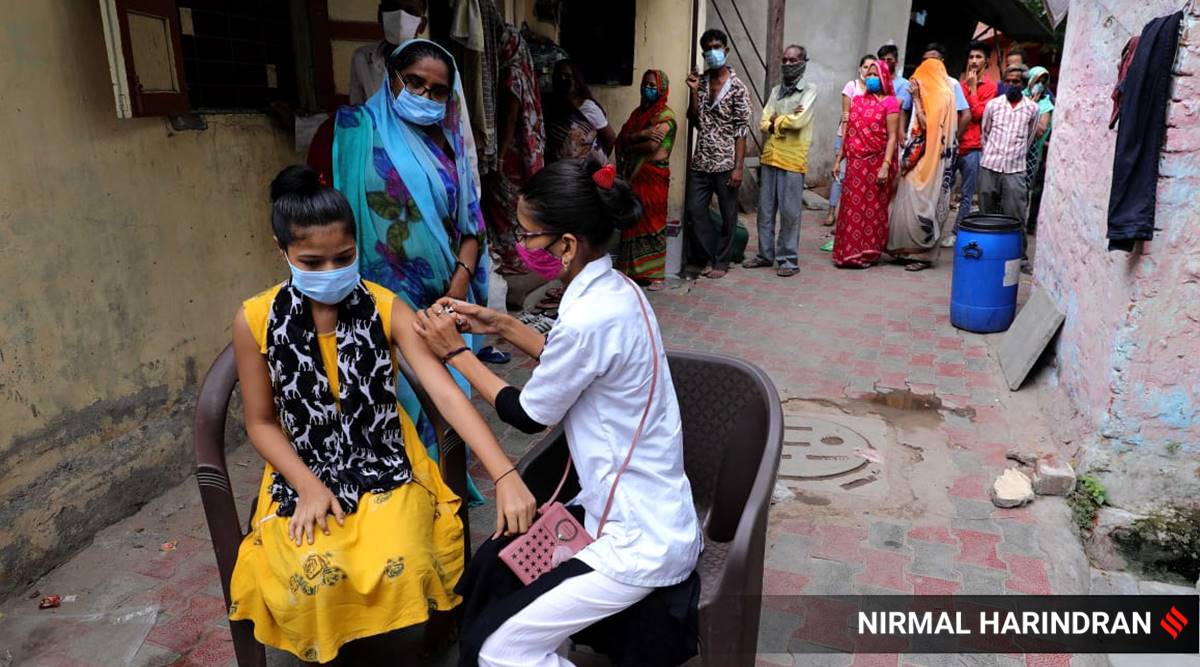July 7, 2021 6:22:36 pm
 Until vaccinations reach a critical mass of the population, India should sustain the momentum of innovating and streamlining various pandemic containment measures.
Until vaccinations reach a critical mass of the population, India should sustain the momentum of innovating and streamlining various pandemic containment measures.
Written by Deepali Khanna and Shibu Vijayan
In the recently-concluded G-7 meeting, the wealthiest democracies reaffirmed their commitment to end the current pandemic and strengthen future health resilience. The leaders collectively pledged to deliver one billion coronavirus vaccine doses over the course of the next year, leverage global manufacturing capacities, improve early warning systems and fast-track the development time of essential items to 100 days. At a time when the pandemic has increased global health inequity, commitment from the leading democracies on global cooperation and joint expanded efforts is a critical first step. For India, an invitation as a “guest country invitee” is a testament to the value that it can add to these global efforts. At the same time, on its home turf, how can India build back better against a possible third wave of the pandemic and other health crises?
A year into the pandemic, India has assembled a diverse portfolio of mitigation tools that includes vaccination, testing, tracing, and surveillance. Notably, for several months preceding the second wave, the country focused distinctly on vaccination. However, the frequency of mutations, and the possibility of vaccine-evading strains have proved to be roadblocks. These concerns aggravate the complexity of inoculating a significant share of the country’s enormous population — achieving herd immunity remains a distant goal.
An integrated strategy that combines testing and tracing with vaccination prioritisation and is informed by an assessment of the potency of existing vaccines against emerging variants is the need of the hour. In the report, “The Road Ahead for Smart Covid-19 Testing and Tracing in India,” experts have outlined the need to incentivise innovations related to testing. To effectively contain the pandemic, affordable, accurate, and scalable diagnostics are vital.
The G-7 countries have leveraged their superior R&D capacities and encouraged innovations. Most have allowed rapid home testing options through lateral flow assays. In Japan, testing kits can be found in vending machines. Such measures lead to intelligent use of a limited workforce, and hospital, and state resources. India’s self-testing kit and saliva-based rapid antigen test kits (validated, though pending approval) are likely to achieve similar positive outcomes.
Until vaccinations reach a critical mass of the population, India should sustain the momentum of innovating and streamlining various pandemic containment measures.
Innovations may come about rapidly, but their adoption and deployment at scale does take time. During a prolonged crisis like the current one, optimising available capacity through technical expertise support becomes an invaluable resource. As an early step against the ongoing pandemic, ICMR had allowed re-purposing and deployment of TrueNat and CBNAAT diagnostic systems (typically used for tuberculosis), given their widespread availability at the district and primary health centre levels. This decision allowed the optimisation of existing platforms and augmentation of testing capacity by the addition of 1,062 labs into the Covid-19 testing network.
On this front, state governments have received support from NGOs and public health innovators in designing appropriate strategies and solutions. Such partnerships focus on streamlining and expediting existing capacities through product and process innovation. This ranges from introducing point-of-care molecular diagnostics to newer generation rapid diagnostic test (RDT) kits with high sensitivity and specificity. In addition to reducing the test result turnaround time and minimising errors in data entry, these innovations are proficient in identifying emerging variants through sequencing. There is also a thrust on process automation in laboratories using cloud pathology and barcoding. These strategic initiatives have positively impacted outcomes by reducing the burden on lab personnel and increasing the efficiency of the screening processes.
Such optimisation measures should now be scaled to strengthen the response of public health systems. India should also institute disease agnostic testing platforms at the primary healthcare level. This will be key to managing health emergencies other than Covid and will breed equity and accessibility to health systems.
The G-7’s recent commitment to building early warning systems assumes significance given that India’s second wave bared the need for tests that can detect pathogens early. Along with an integrated mitigation strategy and optimising laboratory capacities, genomic sequencing is significant. The exercise provides a nuanced understanding of the genetic blueprint of the virus and its likely impact on diagnostics, therapeutics and vaccines. The infrastructure and systems used in sequencing should be robust enough to anticipate existing and emerging variants. The system should be calibrated to collect real-time data from epidemiological and clinical sources, integrate it with data from sequencing and distil it into actionable measures for the public health and policymaking quarters.
The G-7 countries, especially UK, Germany and Canada, have harnessed genome sequencing technology to their advantage. India’s current sequencing efforts could benefit from an immediate scale-up to meet the threshold set by the WHO. Ideally, there should be a joint platform to collaborate and coordinate with national and international establishments and existing global surveillance systems – The Pandemic Prevention Institute of the Rockefeller Foundation, for instance, aims to unite the global community to stop outbreaks within the first 100 days, regardless of the pathogen or region of origin.
Robust systems can only thrive with the right mix of institutional and individual mobility, high-level coordination and transparency between various actors, appreciation of the spirit of innovation, and collective resolve. In view of India’s profound diversity, the above recommendations are just the starting point for future pandemic resilience.
Deepali Khanna is Managing Director, Asia Regional Office, The Rockefeller Foundation. Vijayan is Global TB Technical Director, PATH
- The Indian Express website has been rated GREEN for its credibility and trustworthiness by Newsguard, a global service that rates news sources for their journalistic standards.

